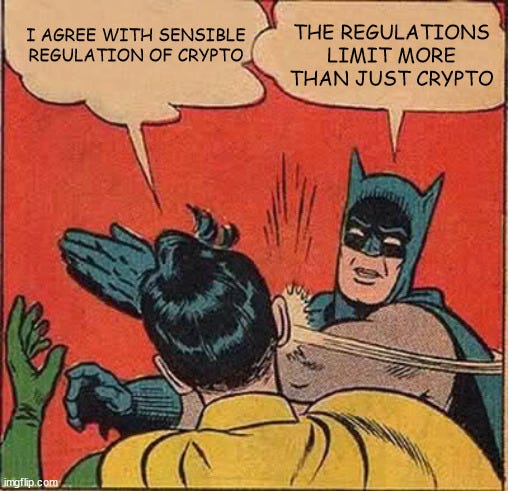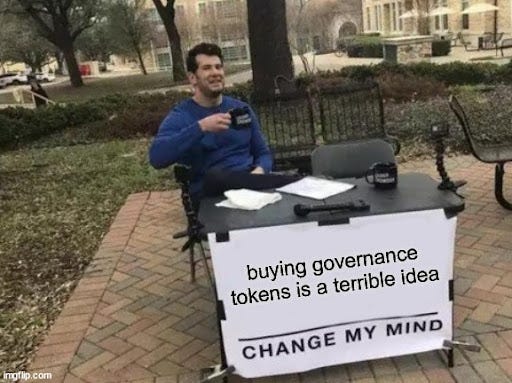Flipside Crypto - Crypto regulation gone wrong
Happy Friday! (According to the data, nearly 2/3 of people in the world at any given moment rate themselves as happy, so that’s a factual statement). Today, we’re back with another installment of Bears Are For Building, the blog that gives you direct access to the learnings of Flipside execs as we try to build better in Web3. Subscribe if you don’t want to miss an insight! (looking for all this “crypto regulation” people talk about)Before the holidays, I was catching up on some articles by possibly my favorite economist, Tyler Cowen. While TC wasn’t a big part of my initial crypto-education “onboarding”, it was writings and analysis by folks like him–investors, economists–who were my early tutors in understanding the crypto world. One article of his in particular covered the dangers of crypto regulation, and the topic has been stewing in my mind ever since, especially as we roll into a fresh tax season. And a new Bankless pod just dropped with him as the guest and regulation as the topic; that’s like catnip for me tbh. Whatever your take on crypto regulation, it’s hard to argue that so far, the conversations have been pretty myopic. So much of the noise we call a discussion on crypto regulation falls on a spectrum between “regulation bad” and “crypto bad”, with the centrist take being, “just get it over with so we don’t have to keep guessing where the lines are”. But for all the talk about crypto regulation after a wild year in the industry, nobody is actually doing too much about new regulations for crypto. Babies and bathwaterWith a quick search, you can easily find nine countries documented to have officially banned crypto. “Sounds like regulating crypto to me,” you might think, and you’d be right. But the regulations never apply to just crypto. In crypto for the real world, I suggest that “crypto” is an unfortunate umbrella term that places far too much implied emphasis on tokens as investable assets. I’ve heard folks in the industry talking about wanting to reclaim the term, to hearken back to the halcyon early days, and distance us from the “web3” jargon that has dominated the lingo for the past couple of years. I tend to like something much more generalized, like “digital assets” but that, too, probably isn’t right. Like most of you probably do, I agree with sensible regulation of crypto. Blame it on my TradFi background, but I believe regulation designed to protect against systemic financial risk is a good thing. I was front-and-center at a bulge bracket bank as the GFC in 2007+ was starting to wreak havoc, and in my early economics training I read about massive blow ups like LTCM in the late 90s. I’m in on avoiding stuff like that happening too often (or ever), and typically regulation to keep things in check is often a good idea. But the financial industry we call crypto is just one application of blockchains and tokens. When we fail to recognize a distinction, broad swaths of quasi- and non-financial applications of the tech get lumped in with hyper-financialized crypto products in regulatory decisions. Crypto. Rules. Everything. Around. Me. ($)To be fair, the bulk of the early products (and “products”) we've seen so far in the industry have been financial. After all, “cash rules everything”. Think of the biggest crypto companies you’ve heard of today: they’re probably an exchange, or maybe an investment fund. But blockchain-based tech has application potential across a range of industries, and I believe the financial products will eventually take a back seat to other uses. Or, at least, not stand alone as the sole output of the technology. So, any regulation that assumes crypto/digital assets for Web3 is shortsighted, and gets in the way of experimenting with new applications, such as in DAOs and governance, gaming, digital identity, social networks, tech and data infrastructure, etc. Take DAOs, for example. Should governance tokens be considered assets, and taxed accordingly? Well, would you pay a tax to vote in your country? If I’m remembering my history correctly, poll taxes have been a major source of discontent amongst various groups of people. Maybe not a great idea for crypto. But Web3 is different. Many DAOs have liquid governance tokens you can buy and sell, which is where things get tricky. It may be possible to interpret a governance token you can sell either as a utility token, or an asset. (For ‘legal reasons’, the above meme is not financial advice. Just educational commentary on utility tokens.)What about NFTs? NFTs have non-financial use cases, especially in social contexts around membership, role, or admission. And yet, like nearly all products in a capitalist economic paradigm, they tend to involve some form of monetary exchange or another. Say you buy an NFT ticket to a Taylor Swift concert, and it happens to be the last one. Suddenly, the price of tickets skyrockets, so you decide to sell yours and use the cash to buy your grandmother the ski lessons she’s always wanted. Should the NFT ticket sale be taxed differently than any other ticket sale in which you make a profit? With poorly-scoped regulation, it might be. But that would be like taxing people differently depending on whether they pay with cash or a debit card. Now, what if you made a different decision? Instead of the ski lessons, you buy a Bored Ape. You then stake that Bored Ape to earn yield, paid in $APE token. Is earning yield on an NFT even legal in your jurisdiction? Is it gaming? Gambling? What is $APE even classified as? (If any of this sounds like your recent, er, Web3 activity, bring your tax professional some coffee and flowers this season.) The point is, Web3 is complicated, and it gets more exponentially so every year. Regulating tech vs regulating contextWhen I hear “Code is law”, my brain has two thoughts. First, a part of me thinks, “that’s not literally true”. Obviously. But then again, code isn’t subject to the whims of any particular person’s mood that day, or whether or not they took a walk that day, or whether they got enough sleep last night. As Eric Voorhees recently said on the Bankless pod–and I’m paraphrasing–the code as built just runs, as long as there is power and activity on the chain. Pretty cool. And second, I realize that if web3 is complicated, this might just be the key to simplifying it enough to regulate it well. You can’t regulate code. It’s a logistical nightmare, because anyone with a computer can create it (and open source it globally in seconds — Tornado Cash still exists). So regulating code isn’t the answer. But you can regulate what we do with it. I don’t know what the right approach to regulation is, but I do know it’s one that considers the industry and context in which blockchain and crypto tech are applied. You can’t regulate tech in a vacuum. It’s how we use what we build that matters. — Want to build better? So do we. Subscribe to get executive-level insights for free, every week. |
Older messages
How blockchain changes us
Friday, January 6, 2023
(Or, "the future is now, old man"). By Daphne Kwon.
Everyone's watching
Friday, December 30, 2022
Building in public, crypto's not-so-secret weapon. By Daphne Kwon
Why I left TradFi for Crypto
Friday, December 23, 2022
(We)b3 Can Do Better
Special Edition: Crypto for the real world
Friday, December 9, 2022
A TradFi migrant's guide
🌲 Comparing top bridging protocols
Friday, December 2, 2022
Proof of Data #3
You Might Also Like
Texas doubles down on crypto with new $250 million Bitcoin reserve bill
Tuesday, March 11, 2025
Texas' second crypto bill seeks to enhance state and local government participation in digital asset investments. ͏ ͏ ͏ ͏ ͏ ͏ ͏ ͏ ͏ ͏ ͏ ͏ ͏ ͏ ͏ ͏ ͏ ͏ ͏ ͏ ͏ ͏ ͏ ͏ ͏ ͏ ͏ ͏ ͏ ͏ ͏ ͏ ͏ ͏ ͏ ͏ ͏ ͏ ͏ ͏ ͏ ͏
How-ey Can Get Out of Here
Tuesday, March 11, 2025
How On-Chain Data Can Clarify the Regulation of Cryptoassets ͏ ͏ ͏ ͏ ͏ ͏ ͏ ͏ ͏ ͏ ͏ ͏ ͏ ͏ ͏ ͏ ͏ ͏ ͏ ͏ ͏ ͏ ͏ ͏ ͏ ͏ ͏ ͏ ͏ ͏ ͏ ͏ ͏ ͏ ͏ ͏ ͏ ͏ ͏ ͏ ͏ ͏ ͏ ͏ ͏ ͏ ͏ ͏ ͏ ͏ ͏ ͏ ͏ ͏ ͏ ͏ ͏ ͏ ͏ ͏ ͏ ͏ ͏ ͏ ͏ ͏ ͏ ͏ ͏ ͏
February CEX Data Report: Significant Decline in Trading Volume Across Major CEXs - Spot Down 21%, Derivatives Dow…
Tuesday, March 11, 2025
In February 2025, the spot trading volume of major CEXs decreased by 21% compared to January. ͏ ͏ ͏ ͏ ͏ ͏ ͏ ͏ ͏ ͏ ͏ ͏ ͏ ͏ ͏ ͏ ͏ ͏ ͏ ͏ ͏ ͏ ͏ ͏ ͏ ͏ ͏ ͏ ͏ ͏ ͏ ͏ ͏ ͏ ͏ ͏ ͏ ͏ ͏ ͏ ͏ ͏ ͏ ͏ ͏ ͏ ͏ ͏ ͏ ͏ ͏ ͏ ͏ ͏
El Salvador defies IMF, continues Bitcoin purchases amid market downtrend
Monday, March 10, 2025
El Salvador's Bitcoin holdings grow to $504 million, challenging IMF directives amid sharp price declines. ͏ ͏ ͏ ͏ ͏ ͏ ͏ ͏ ͏ ͏ ͏ ͏ ͏ ͏ ͏ ͏ ͏ ͏ ͏ ͏ ͏ ͏ ͏ ͏ ͏ ͏ ͏ ͏ ͏ ͏ ͏ ͏ ͏ ͏ ͏ ͏ ͏ ͏ ͏ ͏ ͏ ͏ ͏ ͏ ͏
🖊️ Trump signed an Executive Order for a US Strategic Bitcoin Reserve; Cronos proposed to reissue 70 billion CRO …
Monday, March 10, 2025
Trump signed an Executive Order for a US Strategic Bitcoin Reserve; Cronos proposed to reissue 70 billion CRO for a Cronos Strategic Reserve; Texas's Senate passed bitcoin reserve bill SB-21 ͏ ͏ ͏
Vitalik TAKO AMA: ETH Positioning, Sequencer Centralization, L1 vs L2, Governance, and Success Metrics
Monday, March 10, 2025
On the evening of February 19th at 12 PM UTC and lasting until 12 PM UTC on February 20th, Vitalik Buterin, the founder of Ethereum, was invited to participate in a flash text interview on Tako (a
Donald Trump Creates U.S. Bitcoin Reserve
Monday, March 10, 2025
March 10th, 2025 Sign Up Your Weekly Update On All Things Crypto TL;DR Donald Trump Creates US Bitcoin Reserve Diddy Shows 'Kindness' To Sam Bankman-Fried Robinhood Conducts $1M Crypto Trivia
Bitcoin’s realized volatility surges in as traders face extreme price swings
Sunday, March 9, 2025
Volatility clustering in Bitcoin reveals the impact of turbulent rallies and sharp pullbacks. ͏ ͏ ͏ ͏ ͏ ͏ ͏ ͏ ͏ ͏ ͏ ͏ ͏ ͏ ͏ ͏ ͏ ͏ ͏ ͏ ͏ ͏ ͏ ͏ ͏ ͏ ͏ ͏ ͏ ͏ ͏ ͏ ͏ ͏ ͏ ͏ ͏ ͏ ͏ ͏ ͏ ͏ ͏ ͏ ͏ ͏ ͏ ͏ ͏ ͏ ͏ ͏ ͏ ͏
Asia's weekly TOP10 crypto news (Mar 3 to Mar 9)
Sunday, March 9, 2025
Ms. Sun Xueling, Minister of State, Ministry of Home Affairs of Singapore, said that cryptocurrency fraud cases accounted for a quarter of the total loss amount involved in fraud last year. ͏ ͏ ͏ ͏ ͏ ͏
Trump declares end to ‘war on crypto,’ vows to propel America to Bitcoin supremacy
Saturday, March 8, 2025
Trump brands the Biden era as a crypto setback, .President Trump vows to make America the Bitcoin leader, ending Operation Chokepoint 2.0 and bolstering crypto strategies. ͏ ͏ ͏ ͏ ͏ ͏ ͏ ͏ ͏ ͏ ͏ ͏ ͏ ͏ ͏



